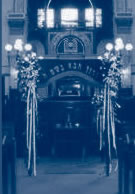|
SEDRA : BALAK Hertz Chumash p. 652 Numbers
Chapter 22
This week's Sedra is generously sponsored by Frank Dobia.
SYNOPSIS BALAK :
Balak, king of Moav, viewed with dismay the victory of the
Israelites over Amorites. Dreading an invasion of his own
country, he formed an alliance with his former enemies, the
Midianites. Balak then sent messengers to ask Bilam of Pethor,
a noted sorceror, to curse the Israelites. Bilam asked the
delegation to stay with him overnight so that he could consult
with G-d, as to whether he could comply with their request.
During the night, Bilam was warned by G-d not to go with the
men, so he sent them away. Thinking that a more tempting invitation
would prove effective, Balak sent a larger and more prestigious
delegation, offering great honour and rewards to Bilam if
he would cooperate. Bilam, obviously motivated by personal
greed, asked the delegation to remain until he could again
receive guidance from G-d. This time Bilam was given permission
to go but to speak only as G-d directed him.
During the journey to Balak, Bilam's donkey saw an angel bearing
a drawn sword obstructing the path and so it turned aside.
The impatient Bilam struck the animal several times in an
attempt to make it proceed. After the donkey protested this
undeserved cruelty, Bilam finally saw the angel himself and
was told he was at fault by inwardly wanting to accept Balak's
offer.
Bilam offered to return home but was told to continue on his
journey and speak exactly as G-d ordered him. Balak met Bilam
at the border of the Arnon River and brought him to a nearby
city for a feast in his honour.
The next day, he took Bilam to a hill sacred to the worshippers
of Ba'al, from where he could see part of the Israelite camp.
After Bilam and Balak had sacrificed a ram and a bullock on
each of seven altars, Bilam told Balak to stay near the burnt-offering
while he withdrew to inquire of G-d. On his return, he delivered
his first speech : "How can I curse the ones that G-d
has not cursed ?" he asked ... "Behold, it is a
people that lives apart and not included among other nations."
Angered at Bilam's unexpected praise for the Israelites, Balak
took him to the top of Mount Pisgah hoping for different results.
However, Bilam once again disappointed Balak by declaring
that G-d would not break His promise of blessing Israel and
that no magic could prevail against them.
In despair, Balak asked Bilam to desist from either cursing
or blessing the Israelites. Before departing, though, Bilam
foretold the sovereignty and glory of Israel and the doom
of Moav, Edom, Amalek and other enemies of the Israelites.
The Israelites then encamped at Shittim. Here, the heathen
women of Moav, advised by Bilam, tempted the Israelites to
join in the worship of Ba'al Peor and to participate in an
orgy of idolatry and immorality. Moses sentenced the sinners
to death and a plague developed among the assembly. Pinchas,
the son of Elazar the Kohen Gadol, witnessed a flagrant act
of immorality between an Israelite Prince and a Midianite
Princess. Zealously defending the laws of G-d, he executed
the evil-doers. The plague subsided but only after twenty-four
thousand of the congregation had perished.
HAPHTORAH HERTZ CHUMASH P 682 Micah Chaps. 5,6
Micah speaks out against oppression of the poor by the wealthy,
the dominance of materialism and the lack of true piety in
the cities of Judah and Israel. This would result in the destruction
of the kingdom of Judah in the same way as the kingdom of
Israel had fallen.
Yet, Israel's future destiny will endure despite the lapses
of the generation. His statement regarding the religion of
truth is one of the most sublime ever recorded. "What
does the Lord your G-d require of you, but to do justly to
love mercy and walk humbly with your G-d".
The mention in the Haphtorah of Bilam and his prophecies is
the common theme between the Sedra and the Haphtorah.
TELL ME RABBI ..... THE THREE WEEKS
The twenty-one days between Tammuz 17 and Tish'ah B'Av are
called "Yeme Ben Hametzarim" (The Days of Difficult
Straits), as described in the Book of Lamentations (13), "...all
her persecutors overtook her between the straits."
Historically this period has seen numerous catastrophes which
have befallen the Jewish people. We therefore limit all forms
of rejoicing, and mourn the destruction of the First and Second
Holy Temples which were both set to flame in this period.
The intensity of mourning practices steadily increases from
the Fast of 17th Tammuz to reach its peak on Tish'ah B'Av
itself, when even the most basic pleasures such as washing,
anointing, eating and drinking are forbidden.
Although it is customary not to hold weddings during the
Three Weeks, engagements, meals in honour of a bris or pidyon
haben are permitted but without music or dancing
We avoid saying the blessing 'Shehecheyanu' during the Three
Weeks in most cases so it is customary not to wear new clothes.
Because of the many major tragedies that occurred in this
period, we are especially careful of entering into situations
which may result in bodily harm.
It is also usual to avoid litigation during this period as
it is considered an inauspicious time.
We do not take a haircut or trim the beard during the Three
Weeks.
During the first 9 days of Av we do not eat meat or drink
wine except on Shabbat since from this time all sacrifices
in the Temple ceased. The Fast of Tammuz is on Thursday 4th
July (dawn to dusk).
This is one of the four fasts ordained by the prophets to
commemorate tragic historic events (Zechariah 8:19).
Five tragedies befell the Jewish people on this date:
Moses smashed the original tablets of G-d's covenant;
the daily sacrifice was suspended in the First Temple due
to a lack of sacrificial animals;
Apostamos, an officer of the wicked Antiochus, burnt of Torah
scroll;
a heathen idol was brought into the Temple compound;
the walls of Jerusalem were breached by Titus' army ending
in the destruction of the Second Temple.
BACK TO SHABBAT SHALOM
TABLE
|








